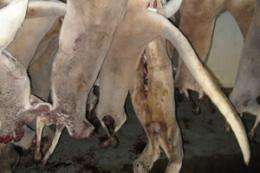Report calls for urgent reform of kangaroo industry

The University of Technology, Sydney think tank on kangaroos – THINKK, has called for a number of policy changes to improve welfare standards in the industry in its latest report, Welfare implications of commercial kangaroo killing: Do the ends justify the means?
The THINKK researchers, based within the UTS Institute for Sustainable Futures, say that every year over a million dependent young die as collateral damage to the commercial kill (about three million adults) – something that would be unacceptable in the livestock industry. The dependent young may be killed through a blow to the skull, for example with a steel water pipe or the tow bar of a vehicle. Others are left alive to later die from exposure, starvation or predation.
A lead author of the report Dr. Dror Ben-Ami said the legitimacy of the ends of the kangaroo industry is questionable, particularly the much inflated perceptions of kangaroos as pests and as a panacea for Australia's land degradation and greenhouse gas emissions.
"Current research does not indicate kangaroos are overabundant in the landscape, in fact there is long-term research showing that there is minimal loss in pastoral property productivity due to competition between livestock and kangaroos for resources.
"On the question of kangaroos replacing livestock as an environmentally-friendly meat source, there is no convincing evidence that such replacement is likely to occur in the future.
"The 'means' by which kangaroos are killed carry a high welfare cost to both adult kangaroos and dependent young that is below the mandated welfare standards in the National Code of Practice for the Humane Shooting of Kangaroos and Wallabies. Many are aware of these welfare concerns, yet nothing has been done to resolve them.
"At the very least we recommend two urgent policy changes that are that are most feasible to implement and would achieve a substantial improvement in welfare outcomes:
• mandating a male only kill would ensure young are not killed;
• requiring that meat processors only accept carcasses with the heads retained and showing that the kangaroos were brain-shot.”
Dr. Ben-Ami said the need for the commercial harvest on the landscape level should be re-evaluated on the grounds of both necessity and ethical considerations.
At the same time kangaroo management at the property level should be reassessed, given a downgrading of the estimated annual costs incurred by farmers due to kangaroos from more than $200 million to $44 million.
"Without a resolution of the outstanding welfare issues of the kangaroo industry, an Australian moratorium and/or international trade ban on commercial kangaroo killing may eventuate," he said.
The report can be viewed here .
Provided by University of Technology, Sydney















